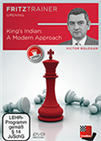Vassily Ivanchuk's 50th birthday
Vassily (actually "Vassyl", but most people refer to the FIDE spelling) Ivanchuk is one of the few players in the world who can, on a good day, really beat anyone. When Garry Kasparov (once again) lost to Ivanchuk, the former World Champion complained:
"Ivanchuk plays sometimes better, sometimes worse, but against Kasparov Ivanchuk always plays like Ivanchuk"
In the late 1980s, Vassily Ivanchuk burst onto the tournament scene. Ivanchuk was one of the best players in the USSR behind Kasparov and Karpov. In 1988, he won silver at the Junior World Championships. Only Joel Lautier was better. He won the 1988 and 1990 Soviet Gold medals at the Chess Olympiad. The fate of the "eternal second" pursued Ivanchuk more and more even in the later years of his career. In July 1991, he was also second in the FIDE World Ranking. Only Kasparov was rated higher.
 Bologan: "If you study this DVD carefully and solve the interactive exercises you will also enrich your chess vocabulary, your King's Indian vocabulary, build up confidence in the King's Indian and your chess and win more games."
Bologan: "If you study this DVD carefully and solve the interactive exercises you will also enrich your chess vocabulary, your King's Indian vocabulary, build up confidence in the King's Indian and your chess and win more games."Following the collapse of the USSR, Ivanchuk continued his winning streak for the Ukrainian team and won silver in 1996, bronze in 1998 and 2000, gold in 2004 and 2010 and bronze again in 2013.
At the FIDE World Cup 2001-2002 Vassily Ivanchuk reached the final, but despite being the favourite he lost to his compatriot Ruslan Ponomariov.
Throughout his career, Ivanchuk has celebrated countless tournament successes, and is particularly strong in rapid and blitz chess tournaments, even if at the World Championships in these disciplines he often lacked that little hint of luck to win the tournament often after he had defeated the favourites. At least once — in 2007 — Ivanchuk did win the title of Blitz World Champion.
Ivanchuk is said to have a photographic memory. So he should be able to look at a page of a magazine briefly and memorize the text. Afterwards, he can recite the page by heart — even if the text is written in a language unknown to him.
Ivanchuk's chess is characterized by great creativity. And just as in chess, the grandmaster often finds unusual solutions to the problems in life and off the board. For example, Ivanchuk was chosen to be the subject of a doping test at the 2008 chess Olympiad. Ivanchuk had just lost his game, unpleasantly, and, annoyed with himself, kicked a concrete wall for punishment — according to eye witnesses. When the doping control officers approached the Ukrainian he either didn't realise it, or was in no mood to cooperate for what many chess players regards as a superfluous exercise.
Ivanchuk was one of the participants in the Candidates Tournament 2013 in London, where he played a pivotal role in the proceedings. Magnus Carlsen, as world number one, was the big favourite there, but the young Norwegian was nervous. In the 12th round, Carlsen lost to Ivanchuk which put Vladimir Kramnik ahead.
But, Kramnik had not yet played against Ivanchuk himself, and in the final round, the Ukrainian grandmaster, who's often referred to as a genius, defeated Kramnik as well, which dramatically allowed Carlsen to win the tournament despite losing his own last round game to Peter Svidler!
Today Vassily Ivanchuk celebrates his 50th birthday. We congratulate you!
This DVD allows you to learn from the example of one of the best players in the history of chess and from the explanations of the authors (Pelletier, Marin, Müller and Reeh) how to successfully organise your games strategically, consequently how to keep y
Translation from German: Macauley Peterson
Links























